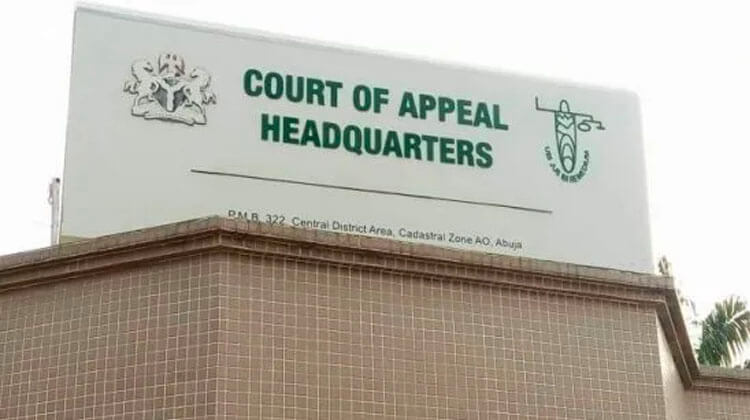In 1976, Nigeria established the Court of Appeal as an appellate court and serves as the second-highest superior court. Its primary responsibility is to review decisions made by lower courts.
Various courts, including the Federal High Court, state high courts, National Industrial Court, Investment and Securities Tribunal, election tribunals (governorship and below), Court Marshall, Federal Consumer Competition Protection Tribunal, Customary Court of Appeal, and Shari’a Court of Appeal hear appeals in the Court of Appeal.
The court consists of the president and 49 justices of which 3 are learned in Islamic personal law and another 3 learned in Customary law. The Court has divisions across various geopolitical zones where panels are constituted to hear appeals from higher courts in that particular zone.
Appointment of President and Justices
- The president appoints the president of the Court of Appeal on the recommendation of the national judicial council and it is to be confirmed by the Senate.
- The president makes the appointment of Justices on the recommendation of the National Judicial Council.
- The requirement for an individual to be appointed as a justice of the Court being not a judge of a higher court is twelve years post-call-to-bar experience.
- Where the office of the president of the Court is vacant for any reason, the president shall appoint the most senior justice of the Court to act pending when a substantive president has been appointed for 3 months.
Read also: Court hierarchy: What you should know
Jurisdiction
The original jurisdiction of the court is to the extent of hearing and determining whether any person has been validly elected into the office the president or vice president of the Federal Republic of Nigeria, and whether the term of office of the president or that of the vice president of the federal republic of Nigeria has ceased, or has become vacant under the constitution.
- The Court exercises appellate jurisdiction over appeals coming from courts below it be it a civil or criminal appeal. These appeals may be right or with the leave of the court. The court may dispose of applications for matters pending even without hearing an oral presentation of the application.
- Where the original jurisdiction of the court is invoked, it sits with a panel of not less than 3 Justices of the court. And where it is to hear an appeal from a lower court, it also sits with a panel of not less than 3 Justices.
- Where it is an appeal from a Shariah court of appeal or Customary court of appeal, it sits with a panel of at least 3 Justices learned in Islamic or Customary law.
- Any appeal coming from the National Assembly election tribunal and state assembly election tribunal, the decision of the court of appeal is final. There shall be no further appeal to the supreme court. Also, decisions of the court in respect of appeals coming from the National industrial court are final except where the appeal is on fundamental human rights.
The National Assembly has the authority to pass legislation expanding the jurisdiction of the court of appeal, be it in original or appellate jurisdiction.
It is important to note that the President and other Justices of the Court are held to the same high standards as other superior court justices and judges. These standards are outlined in the Code of Conduct for Judicial Officers issued by the National Judicial Council, which governs their conduct both in public and while performing their judicial and administrative duties. Any violation of this code will be met with appropriate sanctions from the National Judicial Council, whose responsibility is to ensure compliance.
Authored by Yahaya Yusuf

Aurora Martinez